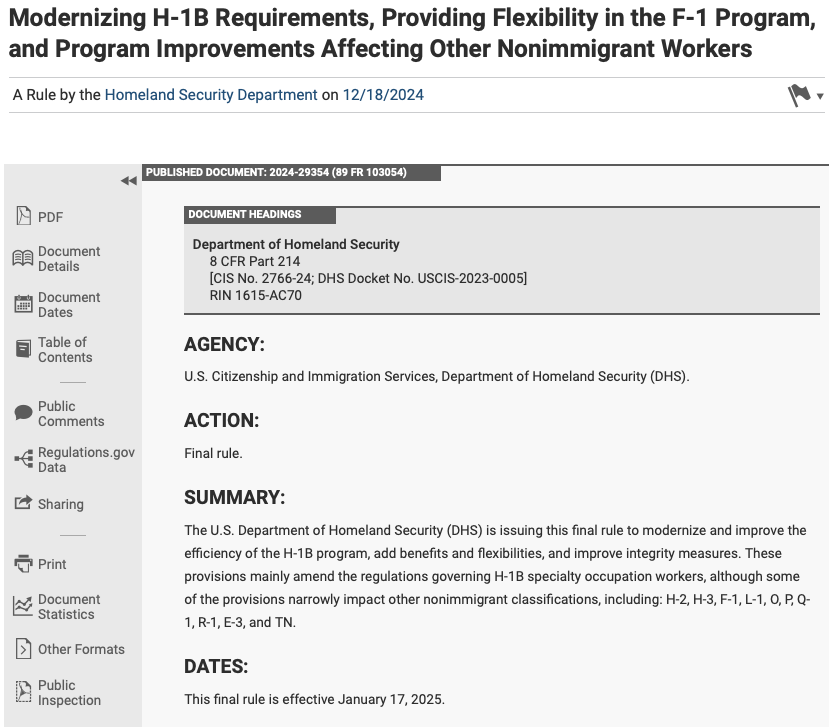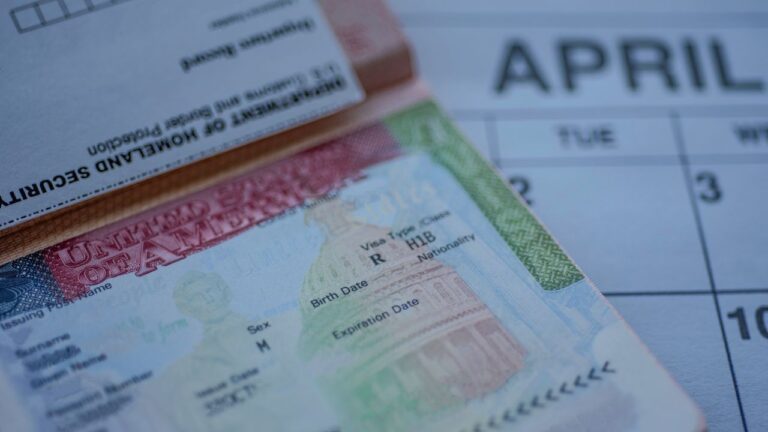Visado H1B Norma de modernización 2024
The updated H-1B regulations introduce significant changes aimed at clarifying and streamlining the process. The definition of a specialty occupation has been refined to remove vague references to general degree titles and now defines “directly related” more clearly. The Department of Homeland Security (DHS) has emphasized flexibility by allowing positions to accommodate a range of qualifying degree fields, especially in emerging fields like STEM and AI. This reflects the evolving workforce demands while ensuring the assessment of specialty occupations remains dynamic and adaptable. USCIS will also give deference to prior approvals involving the same parties and facts unless material errors, changes, or new adverse information arise.
To demonstrate maintenance of status, petitioners can provide various documents, as USCIS now offers a non-exhaustive list rather than rigid requirements. The regulations also revise the standard for bona fide job offers by focusing on confirming the validity of the position rather than enforcing employer-employee relationships, thus enabling telework or remote work arrangements. Contracts or similar evidence may be requested but are not mandatory in most cases. Site visits remain an essential compliance tool, with no increase in scope or frequency under the new rule.
The definition of a U.S. employer has been simplified by removing the employer-employee relationship requirement, replacing it with a bona fide job offer standard. Employers must now have a legal presence in the U.S. and be amenable to service of process. These changes aim to reduce confusion and barriers for petitioners while improving transparency and consistency.
The H-1B registration timeline for FY 2025 includes key dates: account creation begins on February 28, registration opens on March 6, closes on March 25, and selected registrants will be notified by March 31. Petitions may be filed starting April 1. Employers are encouraged to authorize GreenCardGuys Law Group to assess candidates’ eligibility early to avoid prevailing wage complications. Signing a retainer by February 1 ensures sufficient time for a thorough evaluation before the registration period opens.

Specialty Occupation Definition and Criteria
a. Removed the references to general degree titles and defining the term “directly related.”
b. DHS declined to broaden the definition of specialty occupation to specifically state that individuals are not limited to positions within their field of study, as such language conflates the issue of whether a position qualifies as a specialty occupation with the issue of whether the beneficiary is qualified to perform the specialty occupation.
c. Proposed definition already states that a position may allow for a range of qualifying degree fields, provided that each of those fields is directly related to the duties of the position.
d. DHS seeks to create a more flexible definition of specialty occupation that can be adapted to occupations in new and emerging fields, such as STEM and AI, by clarifying that a position may allow for a range of qualifying degree fields. DHS also agrees that it is important to acknowledge the realities of the workforce and the evolving demands of specialized roles, accommodate new and emerging technologies, and be consistent with the dynamic nature of industries. As proposed and finalized, the definition of specialty occupation will make it clear that DHS will consider a range of qualifying degree fields and multiple bodies of highly specialized knowledge when assessing whether a position is a specialty occupation, and that `normally” does not mean “always” within the context of the specialty occupation criteria
Deference to Prior Approvals
Evidence of Maintenance of Status
a. “The updated 8 CFR 214.1(c)(6) provides a non-exhaustive list of documents which may be submitted as evidence of maintenance of status. Petitioners are not required to submit every item listed and may submit alternate documentation not listed.”
Provisions to Ensure Bona Fide Job Offer for a Bona Fide Specialty Occupation Position
a. “DHS is revising the contracts provision at 8 CFR 214.2(h)(4)(iv)(C) in this final rule to state that USCIS may request contracts or similar evidence “showing the bona fide nature of the beneficiary’s position” rather than “showing the terms and conditions of the beneficiary’s work” as stated in the NPRM. This revision is intended to clarify that USCIS will be reviewing contracts or similar evidence to determine if the position is bona fide, not that USCIS will be specifically looking at the terms and conditions of the beneficiary’s work, which could include the terms and conditions as specified by the petition, but would not include the terms and conditions of the beneficiary’s work more generally, which could imply that officers will be looking for an employer-employee relationship or the right to control. As explained in the NPRM and elsewhere in this final rule, DHS is removing the reference to the employer-employee relationship from the definition of U.S. employer, consistent with current practice since June 2020 when, following a court order and settlement agreement,[98] USCIS formally rescinded its January 2010 policy guidance on the employer-employee relationship.[99] As a result, USCIS no longer requires the petitioner to establish a right to control the beneficiary’s work.”
b. “New 8 CFR 214.2(h)(4)(iv)(C) lists examples of evidence that may be requested by USCIS, and submitted by the petitioner, to establish eligibility. If evidence, such as contracts or work orders, is unavailable or does not contain the requested information, the petitioner may submit alternative evidence to establish eligibility.”
c. “New 8 CFR 214.2(h)(4)(iv)(C) does not require the submission of contracts or similar documents, and DHS does not anticipate that this evidence will be requested in all cases. In fact, DHS anticipates that in the majority of cases, petitioners will not be requested to submit contracts or similar evidence to demonstrate the existence of a bona fide position in a specialty occupation position.”
Site visits
a. “Cooperation with these visits is crucial to USCIS’ ability to verify information about employers and workers, and petitioner’s compliance with the terms and conditions of the H-1B petition. Although DHS recognizes that site visits can be a burden for petitioners, and take time for USCIS to perform, this rule does not increase the number of site visits or create any new site visit programs. Rather the rule is further clarifying the scope of the visits and consequences of noncompliance with a site visit.”
Revising the Definition of U.S. Employer
a. “First, DHS will eliminate the employer-employee relationship requirement. In place of the employer-employee relationship requirement, DHS will codify the requirement that the petitioner has a bona fide job offer for the beneficiary to work, which may include telework, remote work, or other off-site work within the United States. DHS also will replace the requirement that the petitioner “[e]ngages a person to work within the United States” with the requirement that the petitioner have a legal presence and is amenable to service of process in the United States.”
b. “DHS will remove from the definition of U.S. employer the reference to an employer-employee relationship requirement, which, in the past, was interpreted using common law principles and was a significant barrier to the H-1B program for certain petitioners, including beneficiary-owned petitioners. This proposed change is consistent with current USCIS policy guidance and will promote clarity and transparency in the regulations. This change will benefit petitioners because it may decrease confusion and increase clarity for stakeholders.”
Does this mean it will be easier for the employer or foreign national? Although the intent of rule may have positive consequences towards reduced RFE, USCIS officers adjudicating these applications could be stuck in their “old ways”. People are generally resistant to change, so we need to expect complications unfortunately. For ultimate peace of mind, you know to authorize GreenCardGuys Law Group.
Key Dates for 2025:
H-1B Registration Process Timeline
Descubra la mejor manera de conectarse con Green Card Guys Law Group según sus necesidades y objetivos específicos. Elija entre 3 opciones personalizadas para comenzar.
¿Qué Hacer Si Te Encuentras en Esta Situación?
Descubra la mejor manera de conectarse con Green Card Guys Law Group según sus necesidades y objetivos específicos. Elija entre 3 opciones personalizadas para comenzar.


